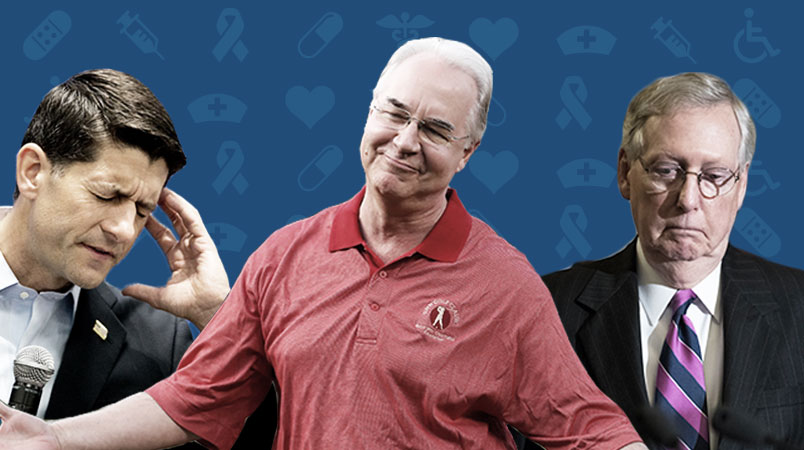August is usually time for Washington to catch its breath, with Congress and the president out of town on recess. But this August brought a non-stop barrage of news, from the devastation wreaked by Hurricane Harvey, to the pardon of former Sheriff Joe Arpaio’s federal contempt charge, to mutual saber rattling with a potentially nuclear-armed North Korea, to the death of a protester at the hand of a white supremacist in Charlottesville.
September promises to be just as wild, especially in the health care space.
Amid looming deadlines for Congress to avoid the twin calamities of a government shutdown and a debt default, lawmakers are also scrambling to pass legislation to stabilize Obamacare’s marketplaces and reauthorize the Children’s Health Insurance Program (CHIP) before it expires at the end of the month. They also plan to tackle an aid package of billions of dollars for the victims of Hurricane Harvey, which has become a public health nightmare in addition to a historic natural disaster.
Behind closed doors, members of Congress are floating various permutations of how to attach politically riskier measures—such as billions in cost-sharing reduction (CSR) payments to insurance companies covering low-income patients under Obamacare—to bills that have to pass one way or another.
A key Senate committee has scheduled four hearings in September on an Obamacare stabilization measure, inviting a mix of Republican and Democratic governors, insurance commissioners, health care experts and other stakeholders to testify about the need for the subsidies and other ways to prevent premiums from climbing.
But on its own, despite broad bipartisan support, Republican staffers fear that Trump would veto such a stand-alone stabilization bill.
Far-right members of the GOP are thinking along the same lines, and are mulling ways to attach measures that chip away at Obamacare—such as a repeal of its medical device tax—to a must-pass bill like the CHIP reauthorization, which funds the health insurance of millions of children.
Either bill could also get lumped in with either a short-term continuing resolution to keep the government afloat or legislation to raise the debt ceiling, both of which the president must sign before the end of the month to avoid a financial disaster that would cast further doubt on Republicans’ ability to govern.
Tackling this policy mountain would be difficult in a normal year, with a Congress whose ruling party generally got along with its president. But President Trump’s continued attacks on leaders of his own party over their failure so far to repeal the Affordable Care Act throw this challenging calendar further into chaos.
A ruling Friday from the Senate parliamentarian that Congress has only until the end of September to attempt to repeal the Affordable Care Act with a simple majority vote (thus avoiding a Democratic filibuster) complicates things even further. Already demoralized by the defeat in July of each one of their different repeal bills, the new reconciliation deadline in their already jam-packed calendar makes the political hurdle for Republicans even higher. Now, instead of spinning to their constituents that they will circle back to Obamacare repeal eventually, or dragging the zombie bill along until a riper political moment, Republicans must either scramble to act or admit defeat.
Add to this toxic mix the fact that Trump has so far refused to say whether he plans to pay the September installment of the CSRs—payments he has frequently threatened to cut off but has continued to authorize each month.
Even if Congress manages to take the power over CSRs out of Trump’s hands by passing a stabilization bill that appropriates CSR funding for a year, those payments wouldn’t kick in until October at the earliest—which could be too late to impact insurance premiums for 2018, which insurance companies are finalizing in the next few weeks.
Another abrupt Trump administration decision late last week could further roil the health insurance market: the slashing of the budget for Obamacare open enrollment outreach.
The Department of Health and Human Services (HHS) announced that it will cut 90 percent of its budget for advertising Obamacare’s open enrollment period and will nearly cut in half the funding for hundreds of navigator groups across the country who provide in-person assistance to people signing up for health insurance.
Former HHS officials and health care experts predict the sharply scaled-back outreach effort will significantly depress insurance signups this fall, especially among the young and healthy, causing premiums to skyrocket.
“The people who are sick will navigate any obstacle in order to obtain insurance,” Josh Peck, the former chief marketing officer for HHS, told TPM. “They don’t need a reminder because their illness is their reminder every day. But healthy people need and respond to reminders, so this clearly will have a negative impact on the risk pool.”







I fear the GOP’s only ruling gear is “clusterfuck.”
This month we’ll confirm Republicans can’t walk and chew gum.
And just because all of this looked too easy…
…Irma is now a Cat 4 with sustained winds of 150mph, well on its way to being a Cat 5.
September is going to be a massive mess.
Not limited to Health Care…
CNN shows it likely tracks straight north through Florida or just east.
Time will tell.